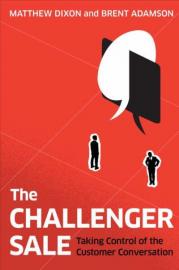Found from a summary of this book:
What’s the secret to sales success? If you’re like most business leaders, you’d say it’s fundamentally about relationships — and you’d be wrong. The best sales-people don’t just build relationships with customers. They challenge them.
Insight #1: There Are Five Kinds of Sales Reps. It turns out that just about every B2B sales executive in the world falls into one of five distinct profiles, a specific set of skills and behaviors that define his or her primary mode of interacting with customers.
These five profiles:
- Hard Workers show up early, stay late and are always willing to put in the extra effort. And they are always looking for opportunities to improve their game.
- Relationship Builders are all about nurturing strong personal and professional relationships and advocates across the customer organization.
- Lone Wolves are deeply self-confident. They tend to follow their own instincts instead of the rules.
- Reactive Problem Solvers are naturally drawn to ensuring that all of the promises that are inevitably made as part of a sale are actually kept once the deal is done.
- Challengers are the debaters on the team. They’ve got a deep understanding of the customer’s business and use that understanding to push the customer’s thinking and teach him or her something new about how his or her company can compete more effectively..
Insight #2: One Is a Clear Winner, One Is a Clear Loser. When you take those five profiles and compare them with actual sales performance, you find that there is a very clear winner and a very clear loser: The Challenger spectacularly outperforms the other four, while the Relationship Builder falls dramatically behind. When we show the results to sales leaders, they find them to be deeply disturbing, because they’ve placed by far their biggest bet on the profile least likely to win.
Insight #3: Someone as a Challenger representative:
- Offers the customer unique perspectives.
- Has strong two-way communication skills.
- Knows the individual customer’s value drivers.
- Can identify economic drivers of the customer’s business.
- Is comfortable discussing money.
- Can pressure the customer.
A Challenger is really defined by the ability to do three things: teach, tailor and take control.